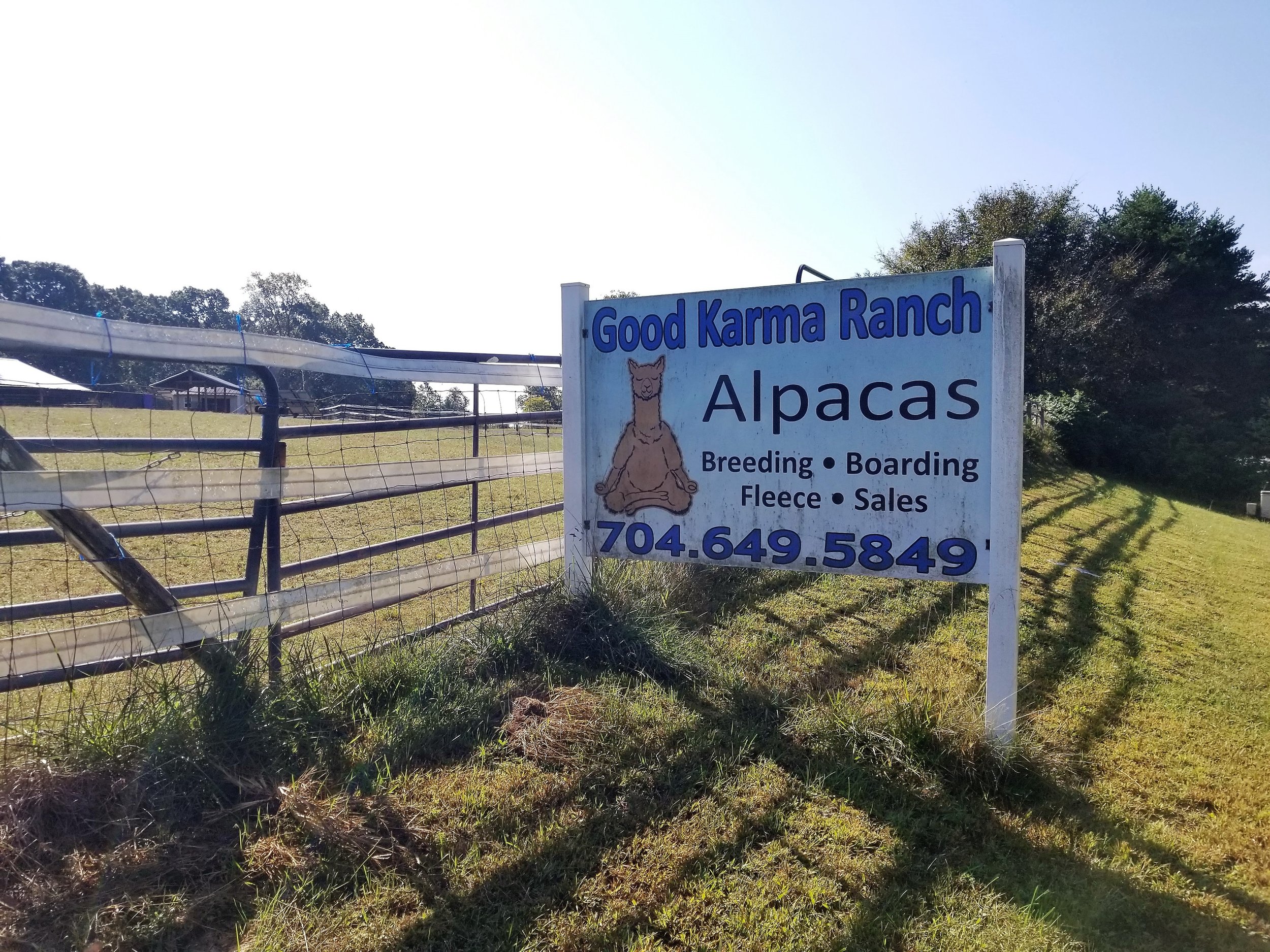Poses & Alpacas: Good Vibes at North Carolina's Good Karma Ranch
Drive about a half hour northwest of Charlotte, NC, and you will find yourself in the rolling tree-lined hills of the state’s Piedmont region. If you assume the homes with large, fenced acreages are horse ranches, you’d be mostly correct, except for one where alpacas are the preferred pack animal, Good Karma Ranch.
Shelly and Mike Walsh live and work on Good Karma Ranch overseeing the care of up to 30 alpacas. They bought the acreage 11 years ago and had horses at first, but they wanted to the ranch to be more of a business than a hobby.
Shelly Walsh talks alpaca at her ranch in North Carolina. Photo by Carrie Dow.
“Alpacas made sense for us because I didn’t want anything we had to slaughter,” explains Shelly Walsh about how she and her husband got into the alpaca business. Turns out alpacas have a lot of advantages when it comes to ranching. But what is an alpaca?
First and foremost, don’t confuse alpacas with llamas. While both critters come from the Andes Mountains in South America, alpacas are much smaller than their llama cousins and both are in the camelid family. Alpacas weigh between 120-200 pounds and live from 15 to 20 years. Another way alpacas differ from llamas is the larger llamas are used to carry heavy loads, while alpacas provide a soft fleece to make yarn, much like sheep. Alpacas are also environmentally friendly. They’re smaller size requires less food and space and since they are camelids, they consume less water. Having padded feet instead of hooves, they don’t trample down grassland and their feces make excellent garden fertilizer with little to no composting because the animal’s three stomachs break down what they eat so completely.
The alpacas join the class. Photo by Carrie Dow.
According to the Alpaca Owners Association (AOA), they have around 4,000 member ranches in North America, including Good Karma, caring for over 275,000 pedigree alpacas in the association’s registry database. That’s a lot of hay and those numbers are growing. Looking at their cute, fluffy faces, it’s easy to see the appeal.
“They don’t take up a lot of space,” Shelly reiterates. “We own 13 acres, but we have maybe 3 or 4 acres fenced, so we needed small livestock animals. You can put about eight (alpacas) to an acre. They don’t tear up the pastures the way the horses did. And they’re cute!”
The ranch offers seasonal yoga classes with the alpacas on weekends and those classes have proven quite popular. I attended class on a sunny autumn morning – blue sky plus gentle yoga plus adorable alpacas equals good vibes.
Yoga instructor Kelly Carver preps the class as alpacas enjoy alfalfa treats. Photo by Carrie Dow.
I have taken animal yoga classes before – cats and goats specifically – and my experience is that the animals are such centers of attention not much yoga happens. It’s more about taking photos and both goats and cats prefer laying on cushy yoga mats which makes doing poses more difficult. Alpacas on the other hand are extremely quiet and unobtrusive, perfect for savasana. They were also far more interested in the baskets of alfalfa Shelly set out. Alfalfa, she says, is a treat for alpacas and, like chocolate cake on birthdays, they receive it only on special occasions such as yoga days.
An alpaca checks to see if a yoga mat is edible. Photo by Carrie Dow.
Our instructor Kelly Carver told the class she had recently moved to Hilton Head, SC, but drove the four hours back to Good Karma Ranch just to teach this class because she loves the alpacas so much. She and Shelly also explained what to expect during class. If we wanted to get close to the alpacas, placing our mats next to the baskets would guarantee an alpaca visit. Those who were unsure could place their mats away from the baskets. Kelly added that alpacas were known as gentle creatures, however, avoid their rear ends in case one decides to kick. She also said that she would keep us on our knees or sitting for the entire class. That way, if anyone did feel overwhelmed or uncomfortable for any reason, they could simply stand up and the alpacas would leave them alone. As mentioned before, alpacas are not that tall so standing up and being at their level would relieve any stress we felt about being underfoot. I can report that no one in the class stood up, even when an older, feisty alpaca named Fancy, tied to sit on one woman’s mat. The woman laughed and gently pushed her away. Kelly also said that everyone was welcome to pet the alpacas, but to pet their bodies rather than their heads, which is good advice for petting any dog, cat, or other mammal you don’t know.
Kelly said the class would run about 50 minutes so we would have time to interact with and take photos of the alpacas before the next class. As we began, the alpacas moved around the space eating out of the many alfalfa baskets and there were buckets of water around the perimeter fence. Shelley says only female alpacas participate in yoga and are always kept separate from the males except during breeding season for “obvious reasons.”
The store at Good Karma Ranch. Photo by Carrie Dow.
While yoga is a fun, interactive farm activity, the main purpose for raising alpacas is fleece. Alpaca fleece is highly prized for its softness and warmth and is hypoallergenic. The animals are clipped every April and their high-end fleece used in a variety of items from socks and scarves to blankets and jacket liners. The ranch also works with a cooperative in Peru that makes high-end pashmina clothing. Good Karma Ranch has these items for sale online and in their onsite ranch store. After class, many attendees including myself did a little shopping. The store resembles a tiny cottage complete with a front porch and porch swing and there are Instagram-worthy murals on the side.
If yoga isn’t your thing – although one attendee announced it was her first yoga class ever so anyone can do this – the ranch offers farm tours where guests can meet the alpacas and learn how the family cares for them. They also have crafting classes, wine tastings, and other events that provide opportunities for people to meet these gentle creatures without doing sun salutations.
“Farm tours [are] probably the thing we do the most,” notes Shelly. “It’s a short walking tour, about 45-50 minutes, and we tour the entire farm, go down and meet the boys, and teaching you about the alpacas. You spend time in the main pen here interacting, taking pictures like what you did [at yoga] this morning.” Farm tours also teach about the other sustainable practices they have such as solar power and rotational grazing and composting. The Walshes also mentor new alpaca ranchers as well as breed alpacas for themselves and for sale.
Alpacas eat while we downward dog. Photo by Carrie Dow.
During the holidays, the ranch takes a break from yoga and tours as the couple use the season to attend events like the Christmas Market at Old Mecklenburg Brewery in Charlotte and the Christmas tree farm at Cedar Lake. They close to the public in January and reopen in the spring.
All events at Good Karma Ranch can be booked online, but if you prefer a private tour for a family or corporate event, email the ranch directly. The tours are stroller, walker, and wheelchair friendly, so everyone can share in the good karma of Good Karma Ranch.
Namaste.














